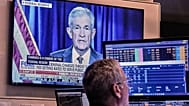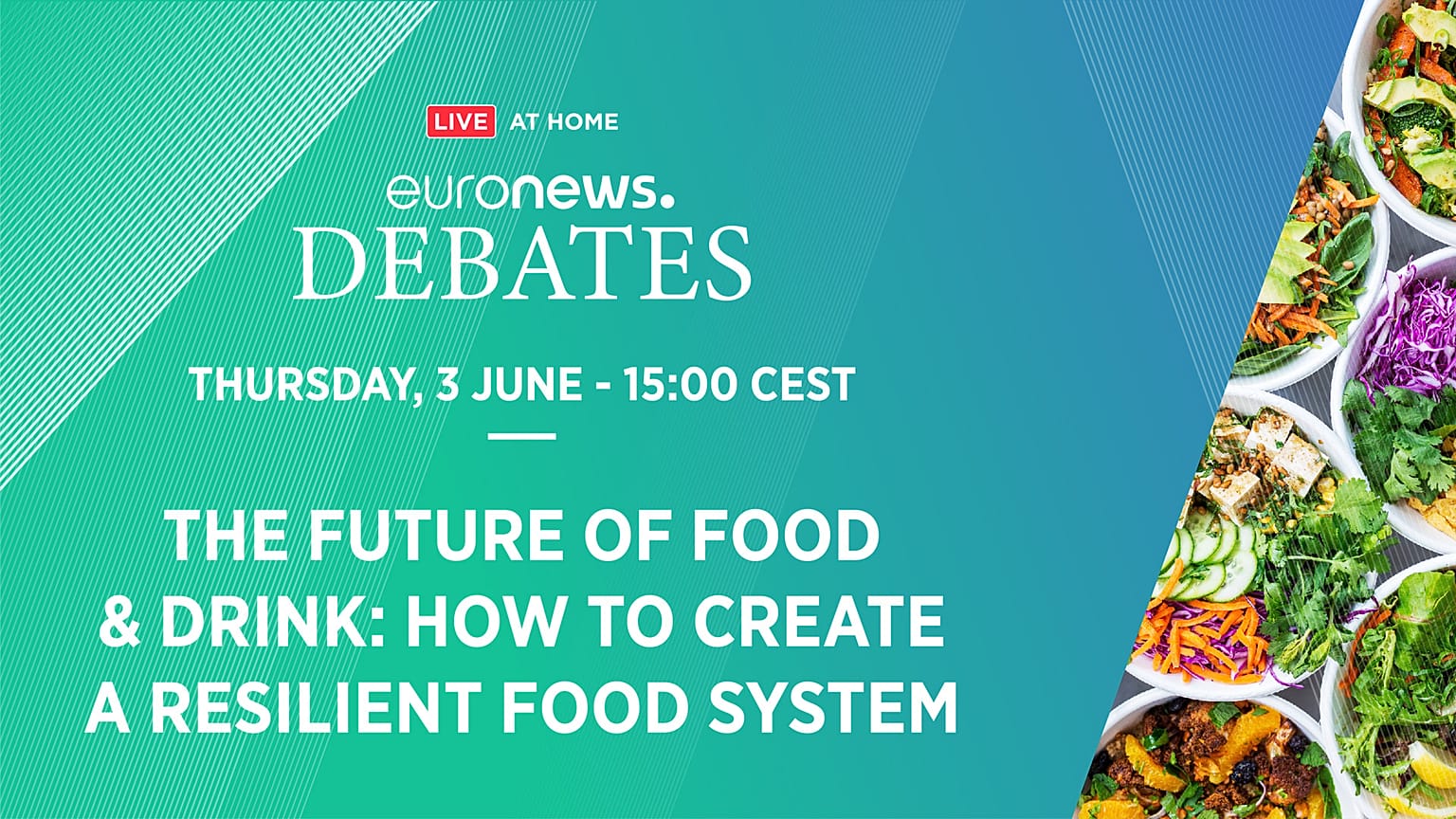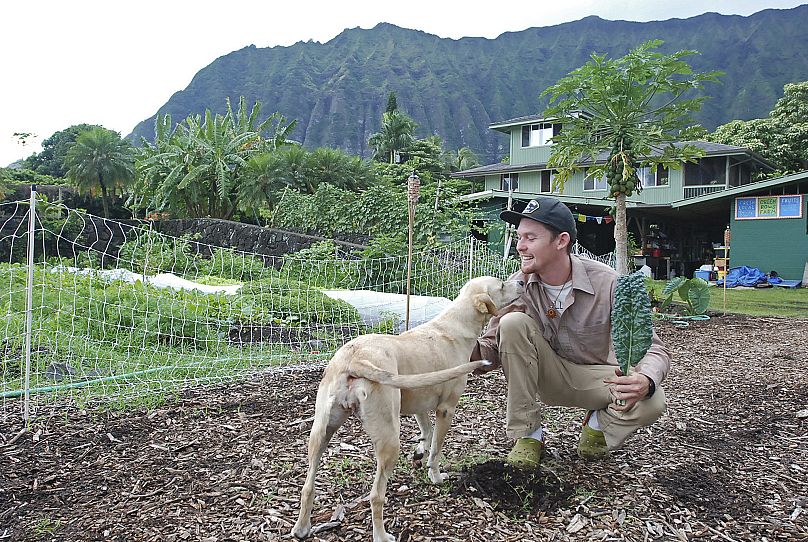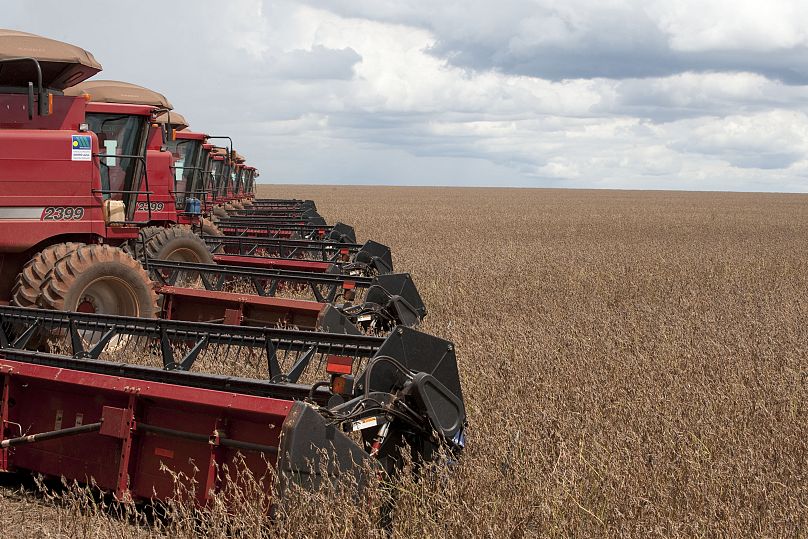How can we ensure our favourite foods and drinks will be available far into the future without costing the Earth? Industry experts and policy-makers shared their success stories on building the food systems of tomorrow at a Euronews Green Debate.
Faced with the impacts of the climate crisis and the pandemic combined with rapid population growth, our food systems are under pressure like never before.
The growing frequency and intensity of natural disasters caused by climate change are having a devastating effect on our food security, according to a new report by the Food and Agriculture Organisation.
Developing countries bear the brunt of this impact, with an estimated US$108 billion (€90 billion) lost from their economies between 2008 and 2018 as a result of disasters, according to FAO.
While food production is heavily impacted by climate change, it is also responsible for one-quarter of the world’s greenhouse gas emissions.
In this context, building resilient and sustainable food systems is a matter of urgency for farmers, industry leaders, policy-makers and consumers.
How can we feed the world's 7.9 billion people without exceeding the planet's limits?
How can we help farmers deal with crises while ensuring they earn fair and reliable incomes? How has the food industry adapted its production and distribution processes to the challenges of climate change?
And how can public policy support environmentally sound and resilient food systems?
Euronews' Green Debate put these questions and more to professionals at the forefront of food production and policy on June 3 at 3pm CEST.
You can watch the full debate in the video player above.
What is sustainability in agriculture ?
The panel debated the definition and meaning of sustainability in agriculture.
Henri Delanghe, Deputy Head of Unit in the Directorate-General for Agriculture of the European Commission, said the European Union's new legislation on organics offered a useful reference to grasp the notion.
María Naranjo, Director of Foods, Wines and Gastronomy at ICEX, the Spanish Institute for Foreign Trade noted that sustainability could not be reduced merely to organic farming -- even if Spain is a world leader in this area.
“Spain is the first organic producer in terms of area cultivated within the European Union and the first organic producer in the world. And just because we have that wonderful weather, that helps very much producing organic products in a sustainable way so that means we don’t have to use polluting energies," Naranjo told the panel.
"For me sustainability is a much stronger objective than organic farming," the Spanish official said.
She gave the example of an organic carrot produced in a northern country "with tons of energy.""Is this really sustainable? Of course, it could be organic. But for me, it's not better than a carrot produced in a regular way but having sustainable ways of producing this carrot,” she explained.
Wellington Rodrigues de Andrade, CEO of Aprosoja Mato Grosso in Brazil, defined sustainability not only in environmental terms but also considering its social and economic dimensions.
"Agribusiness in Brazil represent 26% of the total GDP and the soybean complex makes up 40% of this agribusiness. So we have a very important role in the Brazilian GDP," Rodrigues de Andrade said, adding that the sector contributed to "social development" and "job creation."
What's the role of consumers in building greener food systems?
Consumers have an essential role to play in reducing the carbon footprint of our agriculture.
According to a Euronews online survey, almost 67% of respondents said they took sustainability into account in their food consumption choices but only 33% considered it as a top priority.
Food producers and farmers "will not convert to organic production" unless they "see increased demand for organic products," Delanghe said.
The European Commission expert said the bloc's strategy was therefore to focus on increasing demand for organic products, notably through communication and information measures explaining the benefits of organic agriculture to consumers.
Price of course remains a key factor in consumers' food choices, many panelists said.
Rodrigues de Andrade noted that high price sensitivity in Brazil was a "challenge" to the development organic farming due to more expensive costs of production.
But less rational factors also come into play in consumer's choices.
"I think consumers are a little bit bipolar. They know they have to be healthy and they know they have to really be committed to sustainability. But then the moment they decide to buy, they very much are making emotional decisions," said Naranjo. "You'll have to feed your children. You'll have to feed your husband... So the real change has to be on the side of producers," the Spanish expert told the panel.
What about the supply side ?
According to Naranjo, policy-makers should focus on the supply side to build more sustainable food systems.
Delanghe emphasised the importance of research and innovation to tackle barriers on the supply side.
“We are focusing on increasing the income of the farmer by investing in research and innovation," the European Commission expert said. "So if the farmer has a higher production, even if the prices are lower, he would still retain higher income.”
Areas for innovation include yields and seed varieties, or alternative plant protection products, Delanghe said.
Public procurement -- the purchase by governments and state agencies of goods and services -- is another tool at the disposal of policy-makers to green our food supply chain, the expert noted.
What are the success stories ?
Delanghe discussed a project from the city of Copenhagen which he said illustrated "the power of green public procurement."
The Danish capital, which runs around 900 kitchens for schools, care homes and other public services, has decided to increase the share of organic food in these kitchens to 90%.
For this purpose, the city trained its kitchens "to cook from scratch, so they didn't have to buy anymore semi processed foods and processed foods, so they could spend more on organic products," Delanghe told the panel.
"Then they have also focused on reducing and eliminating food waste. They have bought in-season products, which are of course cheaper And they have also reduced meat consumption."
"When they set this objective, there was no supply system in place that was basically able to cater for such a sudden demand for organic products. But very quickly, the private sector took note of this and organised itself in a way to accommodate this public procurement request. And now we have a fully developed supply chain there," the expert explained.
Rodrigues de Andrade said he was proud of the diversification of his home region's agriculture.
"Mato Grosso now has this opportunity because of the climate and of course, because of the land, the soil, we now have the opportunity to produce all of those crops. Not only the soybean, the corn, not only cotton or even livestock, but those other crops like sunflower and popcorn," he told the panel.
Naranjo cited Spain's forest of olive trees, one of the biggest in the world, as an example of climate change adaptation.
"The way they have adapted to climate change is really amazing. It's really making this whole ecosystem work as a way of living, with cultures and people being economically sustainable in the long term."

















